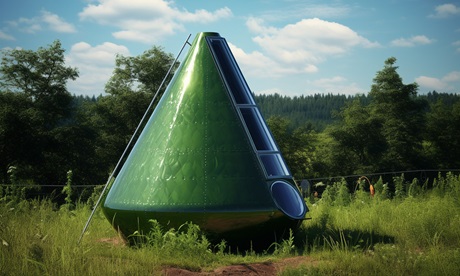Composting is not for everyone.
I realise this when I go home to visit my parents in Florida, or almost anywhere outside states, such as Vermont, that mandate it.
Curbside pickup is rare. Many view it as a chore. Even for people like me who enjoy transforming leftovers into rocket fuel for their garden, composting can turn into a foul, stinking, sulfurous mess.
So, I get it.
A food waste solution
But what if you could make food waste disappear by throwing it into a hole in the ground and walking away?
No more fouled trash. Less climate pollution.
While researching ways to compost, I discovered an easy method to turn virtually any organic waste from veggie scraps to chicken bones to pet waste back into nature: solar digesters.
They don’t produce compost, the rich, fluffy organic matter that turns back into soil.
Instead, these biodigesters — typically little more than half-buried plastic cones within a small patch of dirt — harness microbial workhorses and the sun’s heat to transform organic matter into its elemental components.
These components are mostly carbon, water, CO2 and micronutrients, says Yichao Rui, a soil scientist in the Department of Agronomy at Purdue University.
“Nematodes, bacteria and fungi all work together to decompose all these organic materials,” he says.
“Soil organisms large and small primarily digest and eat them,” transforming plant and animal matter back into the building blocks for soil and air.
It’s a simple, easy, no-mess solution to keep organic waste out of trash and landfills: 58 percent of all methane emissions from municipal landfills are emitted by rotting food.
So this January I ordered my own “Green Cone,” buried it in the ground and began filling it with lots of food waste every week to put it to the test. Here’s what happened.
The mounting food waste problem
Each year, the average household in the United States dumps 300 to 400 pounds (about 136-180 kg) of food waste into the trash, according to the Environmental Protection Agency.
When this is buried in the airless depths of landfills, it turns into methane, a potent greenhouse gas fueling still more warming.
States and federal agencies are hoping to choke off this source of global warming fuel.
First, they hope to prevent food waste: encouraging less wasteful food shopping and storage, as well as donations and upcycling (such as reusing for animal feed).
But waste will always exist, and a rising share of states now treat food waste similar to recyclables: a valuable material that should never go into the trash.
On July 1, 2020, Vermont became the first U.S. state to ban the disposal of most food scraps in the trash or landfills.
Most trash haulers must offer food scrap collection or residents can use home composting (residents who compost at home are not required to compost meat and bones — although you can).
State officials estimate more than half of food scraps are now being diverted from landfills.
Eighty-five percent of Vermonters compost, mostly in their backyards, according to the University of Vermont. Only about a fifth characterize it as “hard or very hard.”
States are following Vermont’s lead by adopting food waste restrictions, says Dana Gunders, executive director of ReFED, a food waste reduction group.
While most policies initially focus on large businesses, residential mandates become more feasible once compost and distribution facilities are in place.
Ten states including Massachusetts and New York, as well as Washington, D.C., now restrict organic waste disposal.
“I do think the emerging science demonstrating food in landfills is responsible for around 10 percent of U.S. methane is driving more attention to organic waste bans and diversion goals,” says Gunders.
What are solar digesters?
Solar digesters remain little known.
For now, “soil savers” ($52), an insulated compost bin for cold climates, and “barrel composters” ($38), a compost bin or drum you can rotate to mix the contents inside, are the most popular, says Josh Kelly, a solid waste program manager at the Vermont Agency of Natural Resources.
But solar digesters are poised to play a much larger role as organic waste bans spread. Read more
- Michael J Coren is a British-Canadian journalist and clergyman. He writes the “Climate Coach” advice column for The Washington Post.
News category: Analysis and Comment.




